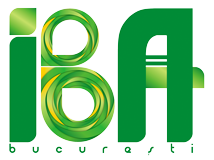On October 23, 2025, the workshop titled “From mapping to action: a co-creation pathway towards gap identification and thematic clustering” took place at the headquarters of the National Institute of Research and Development for Food Bioresources (IBA Bucharest). The event brought together international experts, representatives of European research infrastructures, and decision-makers interested in the impact of artificial materials at the micro and nano scale on health, food, and the environment.
A collaborative framework for interdisciplinary science
The FHERITALE project — Food, Health, and Environment Research Infrastructures to Tackle Emerging Priorities — aims to develop an integrated vision of existing services and technologies relevant to studying the effects of artificial materials on natural and human ecosystems. Coordinated by CERM/CIRMMP (Italy), the project brings together prestigious organizations such as Instruct-ERIC, AnaEE-ERIC, EIRENE, METROFOOD-RI, and others, in a joint initiative to support interdisciplinary research and promote responsible innovation.
Event highlights
The Bucharest workshop opened with a welcome session moderated by Gabriel Mustață (IBA), followed by a general presentation of the FHERITALE project delivered by Antonio Rosato, the project coordinator. Claudia Zoani (ENEA), leader of Work Package 6, introduced participants to the themes of co-creation and mapping of research services.
During the stakeholder presentation sessions, diverse perspectives were shared by representatives of major European institutions and projects, including EMBRC-ERIC, INCDSB, CSIC, RIANA, Euro-BioImaging, ANSES, JRC, IMT Bucharest, MIRRI-ERIC, D4Pack, PlasticHeal, and ENVESOME, among others. The discussions highlighted innovative solutions for pollutant monitoring, plastic recycling, integrated infrastructure development, and addressing the risks associated with micro- and nanometric particles.
After the lunch break, participants engaged in a co-creation process facilitated by Claudia Zoani (ENEA), aimed at identifying priority needs, critical gaps, and the levels of technological and service readiness. The activity culminated in interactive exercises on thematic clustering and actor mapping, designed to strengthen the collaborative network among European research infrastructures.
Conclusions and perspectives
The FHERITALE workshop in Bucharest marked an essential step toward building a common framework for action among research infrastructures in the fields of food, health, and environment. The conclusions and ideas generated during the co-creation sessions will contribute to developing a sustainable cooperation framework, focused on identifying cross-sectoral solutions to the challenges posed by artificial materials at the micro and nano scale.

